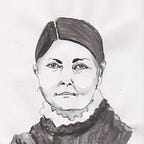George Orwell and Useless Work
“I believe that this instinct to perpetuate useless work is, at bottom, simply fear of the mob. The mob (the thought runs) are such low animals that they would be dangerous if they had leisure; it is safer to keep them too busy to think.” George Orwell, Down and Out in Paris and London, p. 119
In the extraordinary memoir Down and Out in Paris and London, George Orwell masterly describes what it is like to be poor. He tells us how he came to be in a situation of extreme poverty; he is living in Paris teaching English and is suddenly left without students. By a series of steps, he describes how he gradually becomes penniless and hungry, and the different feelings experienced through this new reality that takes over all aspects of his life.
In his first encounter with poverty, when there is no work, and hardly any money, he says: “You discover the boredom which is inseparable from poverty, the times when you have nothing to do and, being underfed, can interest yourself in nothing.” (p.19) Soon after that, he discovers “the great redeeming feature of poverty: the fact that in annihilates the future… When you have three francs you are quite indifferent; for three francs will feed you till to-morrow, and you cannot think further than that.” (p.20).
Orwell describes to perfection how a person in this situation lives, day to day, concerned only…
